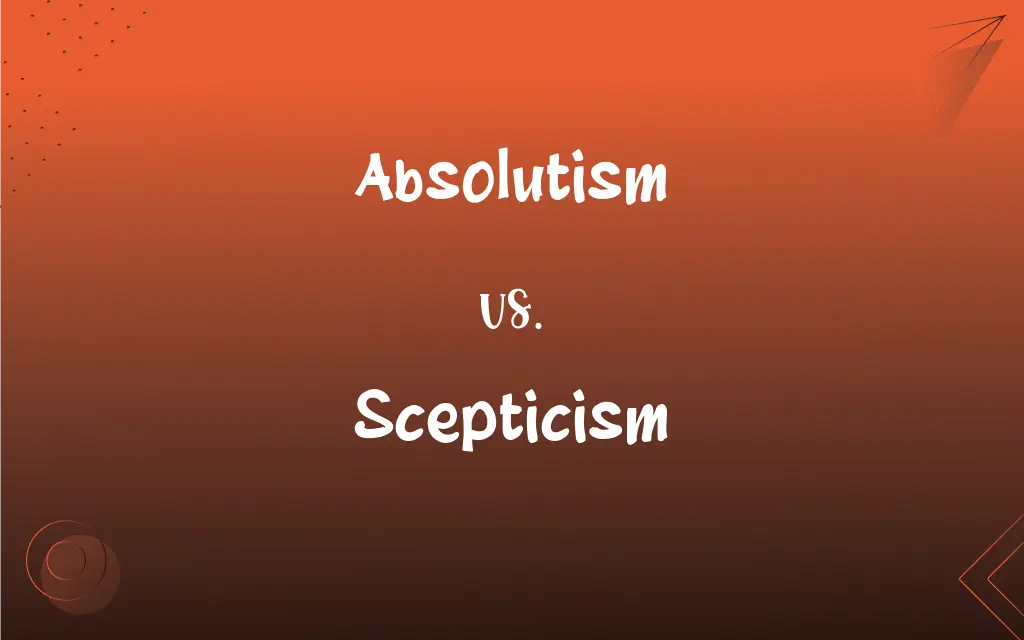Absolutism vs. Scepticism: What's the Difference?
Edited by Aimie Carlson || By Janet White || Published on November 1, 2023
Absolutism asserts unchangeable truths or principles; Scepticism questions the possibility of certain knowledge.

Key Differences
Absolutism, in philosophy or politics, implies a system where control is centralized, often without checks or balances, while Scepticism promotes questioning and doubt about universally accepted truths.
Absolutism often relates to dictatorial power or an unyielding approach to truth, suggesting inflexibility, whereas Scepticism adopts a questioning mindset, challenging the veracity of claims or authority.
Absolutism posits that truth, moral values, or authority are unchanging and definitive, while Scepticism argues that certainty in knowledge is often elusive or impossible.
Absolutism can create an environment where questioning or dissent is discouraged or even punished, in stark contrast to Scepticism, which encourages inquiry and dialogue.
Absolutism, in its assertion of absolute truth, can lead to dogmatism, whereas Scepticism, with its continual questioning, can lead to relativism or nihilism.
ADVERTISEMENT
Comparison Chart
Philosophical stance
Asserts definitive truths or principles
Questions certainty and absolute knowledge
Approach to knowledge
Fixed, often dogmatic
Inquiry-based, doubtful
Flexibility
Inflexible, unyielding
Open, adaptable
Decision-making
Centralized, often unilateral
Encourages dialogue, multiple perspectives
Potential outcome
Can lead to dogmatism
Can lead to relativism or nihilism
ADVERTISEMENT
Absolutism and Scepticism Definitions
Absolutism
Unquestioning adherence to principles or policies.
His political absolutism leaves no room for debate or compromise.
Scepticism
Doubt as to the truth of something.
Her scepticism keeps her from taking the rumor at face value.
Absolutism
The acceptance of or belief in absolute principles.
He argues from a point of absolutism, leaving no room for alternative perspectives.
Scepticism
A skeptical attitude; doubt as to the genuineness of something.
The lawyer's scepticism about the witness's testimony was evident.
Absolutism
Totalitarian control in governance.
The king's absolutism allowed no dissent in the court.
Scepticism
The theory that certain knowledge is impossible.
His scepticism about climate data prevents him from accepting common conclusions.
Absolutism
A system or condition of absolute control or power.
The country's absolutism has led to widespread social unrest.
Scepticism
An attitude of doubt or a disposition to incredulity.
Despite his claims, she viewed his strategy with scepticism.
Absolutism
A political theory holding that all power should be vested in one ruler or other authority.
Scepticism
The doctrine that absolute knowledge is impossible, either in a particular domain or in general.
Philosophical scepticism challenges the very foundations of our understanding.
Absolutism
A form of government in which all power is vested in a single ruler or other authority.
Scepticism
Variant of skepticism.
Absolutism
An absolute doctrine, principle, or standard.
Scepticism
(British spelling) skepticism
Absolutism
(theology) Doctrine of preordination; doctrine of absolute decrees; doctrine that God acts in an absolute manner.
Scepticism
The disbelief in any claims of ultimate knowledge
Absolutism
The principles or practice of absolute or arbitrary government; despotism.
Absolutism
(philosophy) Belief in a metaphysical absolute; belief in Absolute.
Absolutism
Positiveness; the state of being absolute.
Absolutism
(rare) The characteristic of being absolute in nature or scope; absoluteness.
Absolutism
The state of being absolute; the system or doctrine of the absolute; the principles or practice of absolute or arbitrary government; despotism.
The element of absolutism and prelacy was controlling.
Absolutism
Doctrine of absolute decrees.
Absolutism
Dominance through threat of punishment and violence
Absolutism
A form of government in which the ruler is an absolute dictator (not restricted by a constitution or laws or opposition etc.)
Absolutism
The principle of complete and unrestricted power in government
Absolutism
The doctrine of an absolute being
Absolutism
Certainty in the truth, especially in philosophy or morality.
Her moral absolutism provides a clear, if rigid, ethical framework.
FAQs
Does absolutism allow for debate?
Typically, absolutism doesn't encourage open debate due to its fixed truths.
Is absolutism applicable in democratic societies?
Absolutism, with its centralized power, is generally contrary to democratic principles.
Does scepticism reject all knowledge?
Not all; it promotes questioning and verification of supposed facts.
Are there risks to moral absolutism?
It can lead to intolerance or extremism due to its inflexible stance.
Can scepticism coexist with belief?
Yes, many people balance belief with a healthy dose of scepticism.
Is religious absolutism common?
It occurs in many religions that assert absolute truths or divine laws.
What's a potential downside of scepticism?
Excessive scepticism can lead to indecision or nihilism.
Is moral absolutism rigid?
Generally, it adheres strictly to defined moral principles.
Can scepticism lead to cynicism?
Yes, unchecked scepticism can evolve into cynicism.
Is scepticism a philosophy?
Yes, it's a philosophical tradition dating back to ancient Greece.
Can absolutism apply to ethics?
Yes, in asserting definitive right and wrong behaviors.
Does absolutism always support authoritarianism?
Often, but not always; it denotes absolute principles, which can be non-political.
Is scepticism a modern concept?
No, its origins can be traced back to ancient philosophical inquiries.
How does scepticism affect decision-making?
It encourages scrutiny and critical thinking before making decisions.
Can scepticism lead to innovation?
Yes, questioning established beliefs can foster innovation.
Does scepticism challenge authority?
Often, as it questions the validity of accepted truths.
Is all scepticism constructive?
Not always; it can sometimes hinder progress if overly critical.
Does political absolutism limit freedoms?
Generally, yes; it centralizes power, often curtailing individual rights.
Is absolutism based on certainty?
Yes, it asserts certain truths or principles.
Are there different forms of absolutism?
Yes, including moral, political, and religious absolutism.
About Author
Written by
Janet WhiteJanet White has been an esteemed writer and blogger for Difference Wiki. Holding a Master's degree in Science and Medical Journalism from the prestigious Boston University, she has consistently demonstrated her expertise and passion for her field. When she's not immersed in her work, Janet relishes her time exercising, delving into a good book, and cherishing moments with friends and family.
Edited by
Aimie CarlsonAimie Carlson, holding a master's degree in English literature, is a fervent English language enthusiast. She lends her writing talents to Difference Wiki, a prominent website that specializes in comparisons, offering readers insightful analyses that both captivate and inform.































































